Which of the following platforms is best for your store: BigCommerce or Shopify?
There are many platforms that allow you to set up and manage your store if you want to start a dropshipping business. BigCommerce and Shopify are two excellent examples. What makes some people choose Shopify while others go with BigCommerce? What distinguishes these two platforms from one another and what are their main differences?
You can find all the answers in this article, which will compare BigCommerce vs. Shopify, go over the key features of each platform in detail, and then choose a winner. After reading this article, you won't be unsure of which platform to use for your dropshipping store based on your own requirements.
Before we dive into the main details, let’s go for a quick review of what Shopify and BigCommerce is, so that there are no mismatch of information between us regarding these platforms.
What is Shopify?
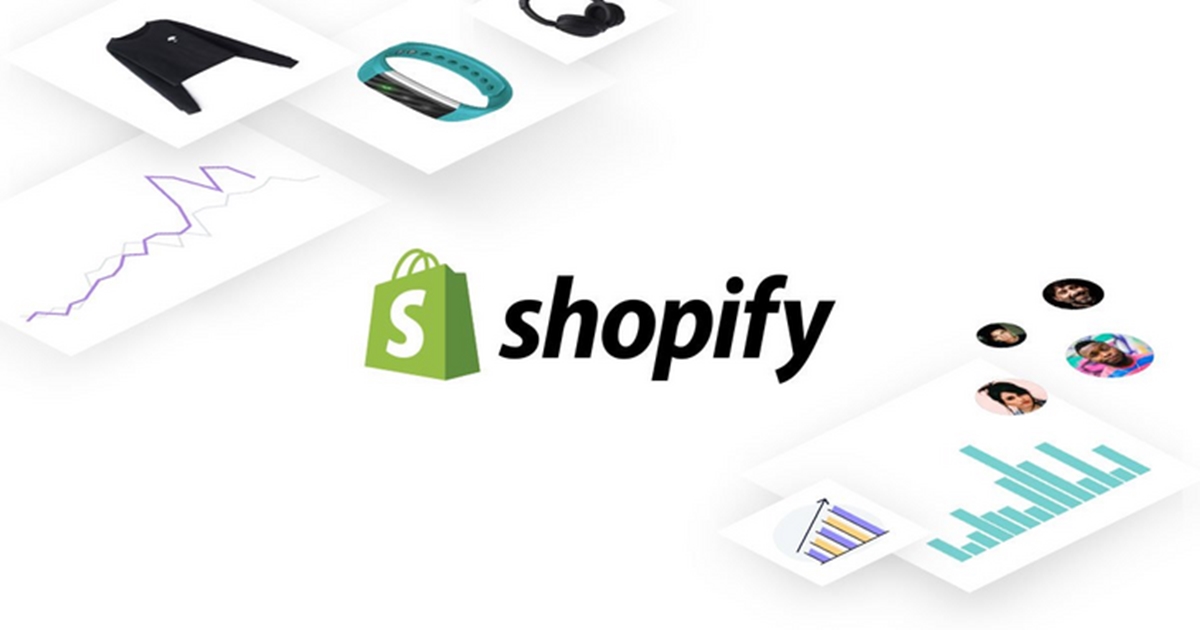
Use the Shopify eCommerce platform to establish your store both online and offline. Bloggers use WordPress, store owners use Shopify, so the saying goes. You can use your own website and the Shopify POS to sell both online and offline.
Whether users are eCommerce novices or seasoned pros, Shopify is an eCommerce website builder with features for everyone.
Shopify offers a 14-day free trial so you can try it out for yourself before committing any money. You can create your own online store, try out free Shopify apps, and, if you're brave and decide to try selling, you'll probably make your first sale with the free plan as well during your free trial period.
If you choose the Lite plan, Shopify's monthly prices start at $9. However, since this plan gives them more customization options, the majority of new store owners begin with the $29/month Shopify Basic plan.
Depending on your unique business requirements, the Shopify, Advanced Shopify, or Shopify Plus plan may be appropriate for you if you are an eCommerce veteran looking to scale up your store.
What is BigCommerce?
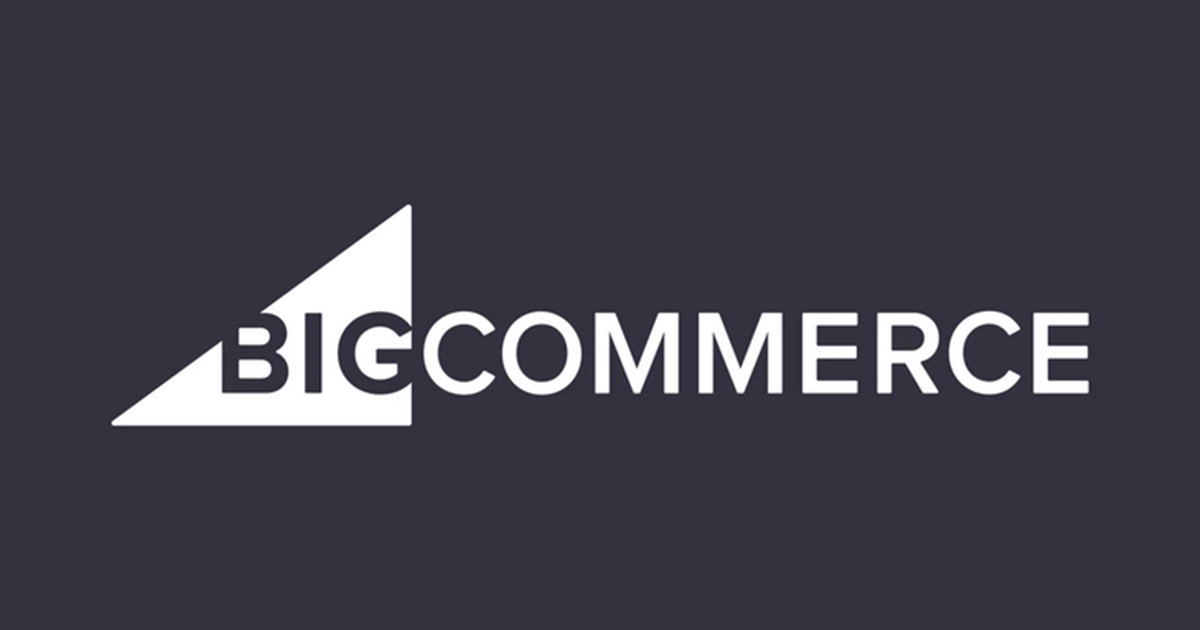
Tens of thousands of online stores in more than 150 countries are powered by BigCommerce, an eCommerce store builder that is comparable to Shopify. BigCommerce allows you to sell both physical and digital products, and it comes with a variety of customizable templates to help you design your online store based on your own brand aesthetics. There are also numerous tools available to help you promote your store.
With BigCommerce, you are in complete control of the process, from adding products to processing orders to uploading product images.
In 2009, BigCommerce was established. Since that time, the business has offered two basic plans for new or small to midsize businesses and two premium plans for established or high-volume enterprises. Each of these plans offers a variety of features, including product ratings, abandoned cart recovery, fraud monitoring, and many more.
A wide range of industries are served by BigCommerce, including those for electronics, health products, apparel, gifts, jewelry, and many others. Last but not least, BigCommerce can be integrated with a variety of shopping and comparison websites, including NexTag, Shopzilla, eBay, and Shopping.com.
BigCommerce vs Shopify: Advantages and disadvantages
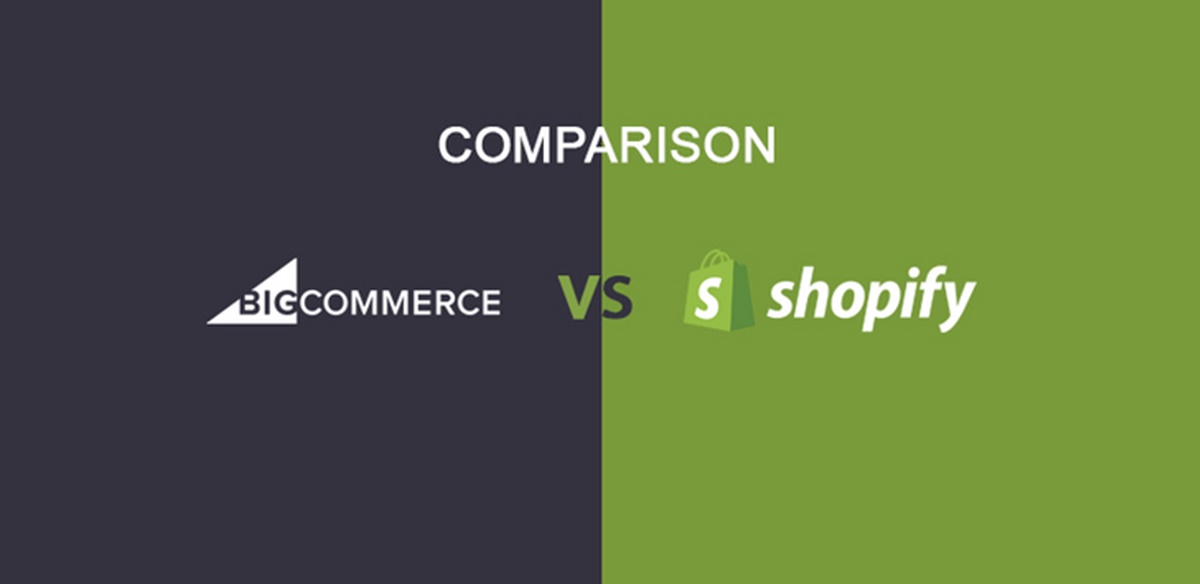
Shopify’s Pros and Cons
Advantages:
- - More integrations and apps
- - No selling limits
- - Fast load time and website speed
- - Easy and intuitive to use.
Disadvantages:
- - You need third-party apps to get the functionality you want
- - SEO features not really strong
- - Transaction fees for third-party gateways
BigCommerce’s Pros and Cons:
Advantages:
- - Better cart abandonment saver setup
- - Real-time shipping quotes and gift cards available at $29/month (It’s $79/month with Shopify)
- - BigCommerce’s collection of SEO tools will help you market your website easier; BigCommerce is better than Shopify in terms of search engine optimization.
Disadvantages:
- - No built-in on-click selling
- - Selling limits
- - Fewer apps and integrations than Shopify
BigCommerce vs. Shopify: Pricing Comparison
When considering any purchase, price is typically the most important consideration. It doesn't matter how great a product is if we can't afford to buy it, so we need to know the price first.
Fortunately, there is a plan for everyone at BigCommerce and Shopify, regardless of your financial situation or ability to invest significantly in order to scale up your business.
Shopify Pricing
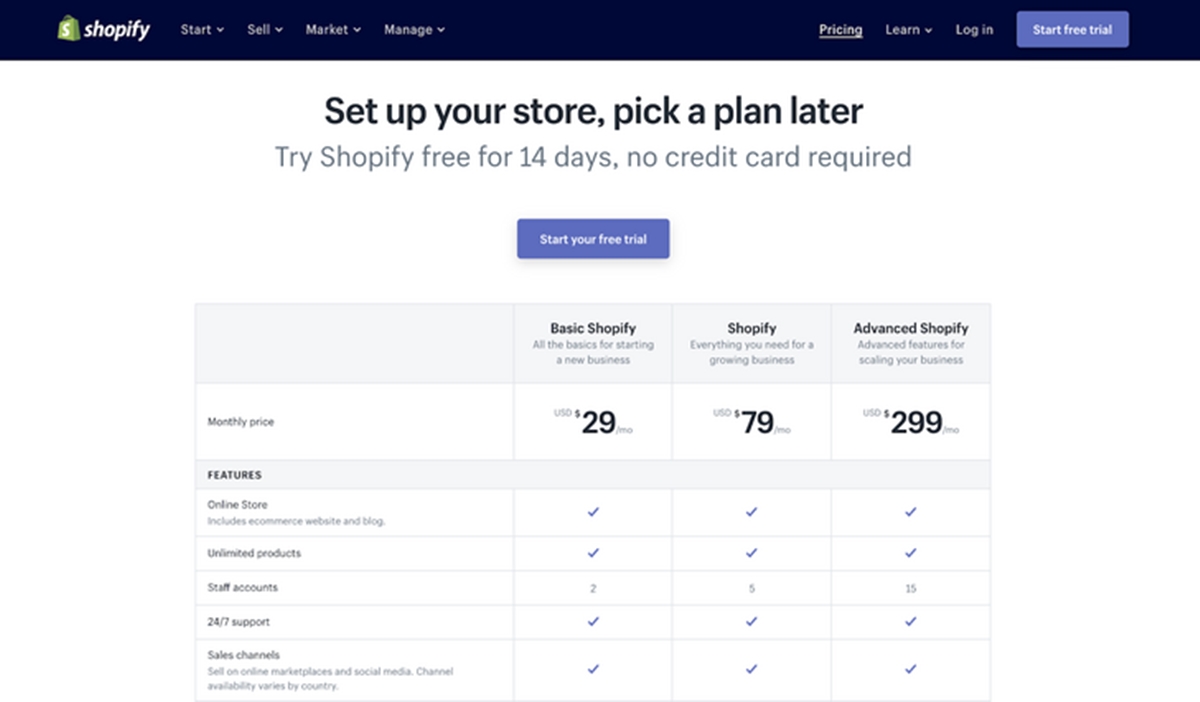
Shopify offers its users four monthly pricing plans:
- - The Shopify Lite Plan: $9/month (This plan is hidden from the pricing page)
- - The Basic Shopify Plan: $29/month
- - The Shopify Plan: $79/month
- - The Advanced Shopify Plan: $299/month
BigCommerce’s Pricing:
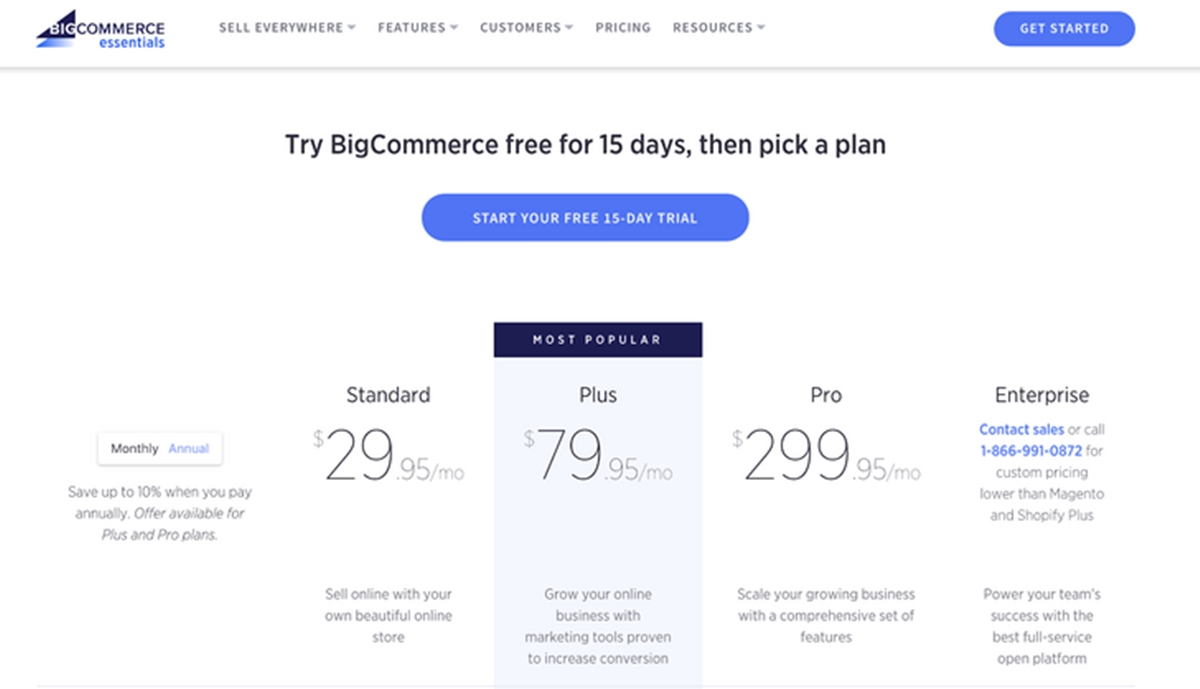
Unlike Shopify, BigCommerce offers three pricing tiers:
- - The Standard Plan: $29.95/month
- - The Plus Plan: $79.95/month
- - The Pro Plan: $249.95/month
BigCommerce vs. Shopify: Features comparison
Shopify’s Features:
| Basic Shopify $29/month | Shopify $79/month | Advanced Shopify $299/month | |
|---|---|---|---|
| One-click Upsells | No | No | No |
| Abandoned Cart Email | Yes | Yes | Yes |
| Digital Products | Yes | Yes | Yes |
| Personalized Products | No | No | No |
| Product Export/Import | Yes | Yes | Yes |
| Product Search | No | No | No |
| Ratings & Reviews | Yes | Yes | Yes |
| Real Time Shipping Rates/Tracking | No | Yes | Yes |
| Reward Points | No | No | No |
| SEO Tools | No | No | No |
| Subscription/Recurring | No | No | No |
| Zoomable Product Images | Yes | Yes | Yes |
| Upselling & Cross Selling | No | No | No |
BigCommerce’s Features:
| BigCommerce Standard $29.95/month | BigCommerce Plus $79.95/month | BigCommerce Pro $299.95/month | |
|---|---|---|---|
| One-click Upsells | No | No | No |
| Abandoned Cart Email | No | Yes | Yes |
| Digital Products | Yes | Yes | Yes |
| Personalized Products | No | No | No |
| Product Export/Import | Yes | Yes | Yes |
| Product Search | Yes | Yes | Yes |
| Ratings & Reviews | Yes | Yes | Yes |
| Real Time Shipping Rates/Tracking | Yes | Yes | Yes |
| Reward Points | No | No | No |
| SEO Tools | Yes | Yes | Yes |
| Subscription/Recurring | No | No | No |
| Zoomable Product Images | Yes | Yes | Yes |
| Upselling & Cross Selling | No | No | No |
Feature Comparison:
BigCommerce vs. Shopify: Theme Design comparison
Here is the reality. Regardless of how fantastic your products are, if your front store is a mess, website visitors will leave before even seeing your product. This is because, just as offline customers judge a brick-and-mortar store by its store design, online shoppers use a store's website design as their first point of comparison.
How do BigCommerce and Shopify stack up against one another in terms of web design? Starting with Shopify.
Shopify’s theme design:

With Shopify, you can choose from more than 100 different themes (both free and paid ones). The commonality among Shopify themes is that they all have a sleek, contemporary, and minimalist aesthetic. Finding a theme that is appropriate for your particular niche or market will be very simple thanks to the fact that Shopify themes are divided into a wide variety of categories for a wide range of industries.
Themes for Shopify are typically created by outside theme designers. All of Shopify's premium themes cost between $80 and $180 in a single one-time payment. There are seven useful free themes to choose from if you want to test the platform out before buying any themes.
With this fantastic library of themes, the Shopify user community has been producing some fantastic things, and many of the live stores are truly impressive. For ideas for your upcoming store, look through this gallery of active Shopify stores.
BigCommerce’s theme design:
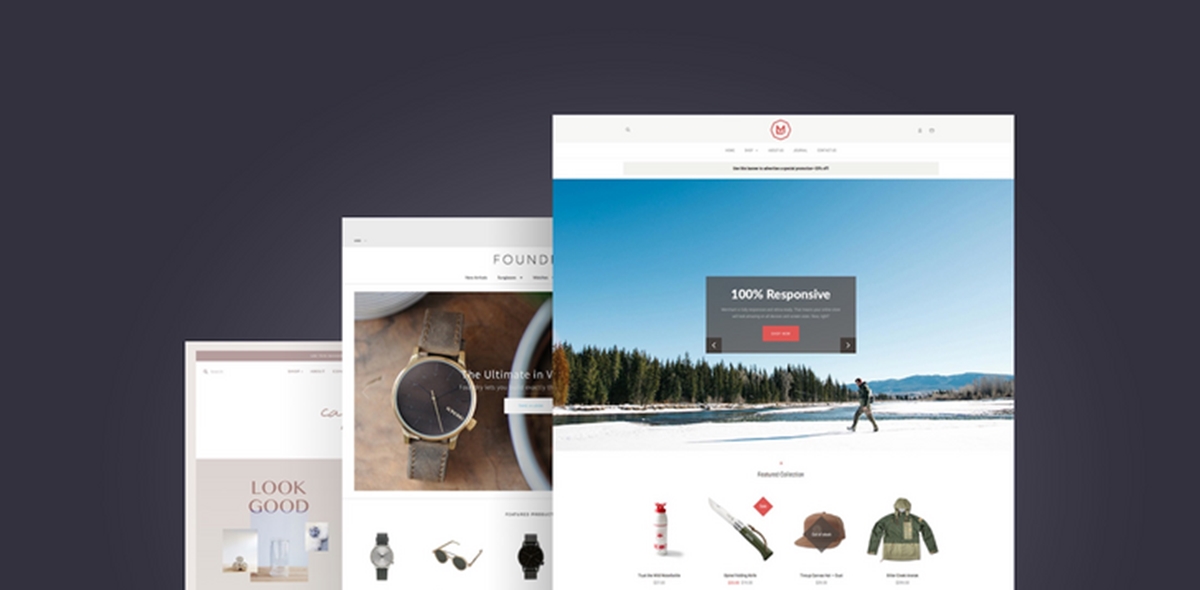
BigCommerce is a participant that has the potential to be as potent as Shopify in terms of theme design. Both free and premium themes are available through BigCommerce, and they are all separated into distinct categories for various industries. They are all also responsive and completely customizable.
Similar to Shopify, BigCommerce has a dedicated gallery of user sites that have already been created. To see how BigCommerce uses its power for theme design, check them out.
Theme Design Comparison
Although BigCommerce and Shopify both provide free themes as a starting point, BigCommerce's free templates resemble each other more than they do original artwork. The 10 free themes that Shopify offers, in contrast, differ significantly from one another. The themes on either platform can be customized to meet your needs with a little programming knowledge or the help of a skilled web developer. If you don't have both of those, you can hire the platform's developers to do it for you for a small fee.
The themes from BigCommerce and Shopify are both responsive and completely customizable. BigCommerce's most expensive premium themes are less expensive than Shopify's. BigCommerce's highest price is $235 while Shopify's is $180.
BigCommerce vs. Shopify: Ease of Use

The user interfaces of BigCommerce and Shopify are both friendly. Both of them have comparable dashboards that make it simple to control everything in your front store.
Shopify:
One of the best user interfaces on the market for website solutions is that of Shopify. The sidebar to the left contains all the information you need to manage your store. It's very simple to add products, change the content on your website, make discounts, and other things.
BigCommerce:
Just like Shopify, BigCommerce provides a user-friendly admin panel. BigCommerce offers more features out of the box than Shopify, so you'll need to become more familiar with more aspects of your store's backend.
But in my opinion, it's well worth taking a little more time to build a solid store so you can fully utilize the reporting and discounting features.
Comparison:
On-page customization is one particular area where Shopify is outperformed by BigCommerce. Shopify doesn't meet your needs if you enjoy the simplicity that a drag-and-drop builder offers. The drag-and-drop builder in BigCommerce, on the other hand, is extremely user-friendly.
The feature navigation and usability you would expect from a top shopping-cart solution are both offered by BigCommerce and Shopify. In this case, I would say that BigCommerce loses to Shopify (by a very slim margin), as Shopify is a simpler option from the start (which is why I say for beginners). That's just my opinion; your decision will be entirely based on your individual needs.
Simply test out both platforms to determine which is more user-friendly for you. Both BigCommerce and Shopify provide a free plan for you to test out their backends, making it simple and cost-free to do so.
Both solutions allow you to edit the HTML and CSS code for more in-depth customization. You'll also need a strong customer support group to get your online store back up and running as soon as possible when something goes wrong.
Although Shopify and BigCommerce both offer a variety of support options, Shopify is more open about how to get in touch with them (which means you can find it easier than on BigCommerce).
However, the level of support you get will be about the same. Both Shopify and BigCommerce offer live chat, email, and phone support that is available around-the-clock, as well as support materials and active user communities.
BigCommerce vs. Shopify: Performance
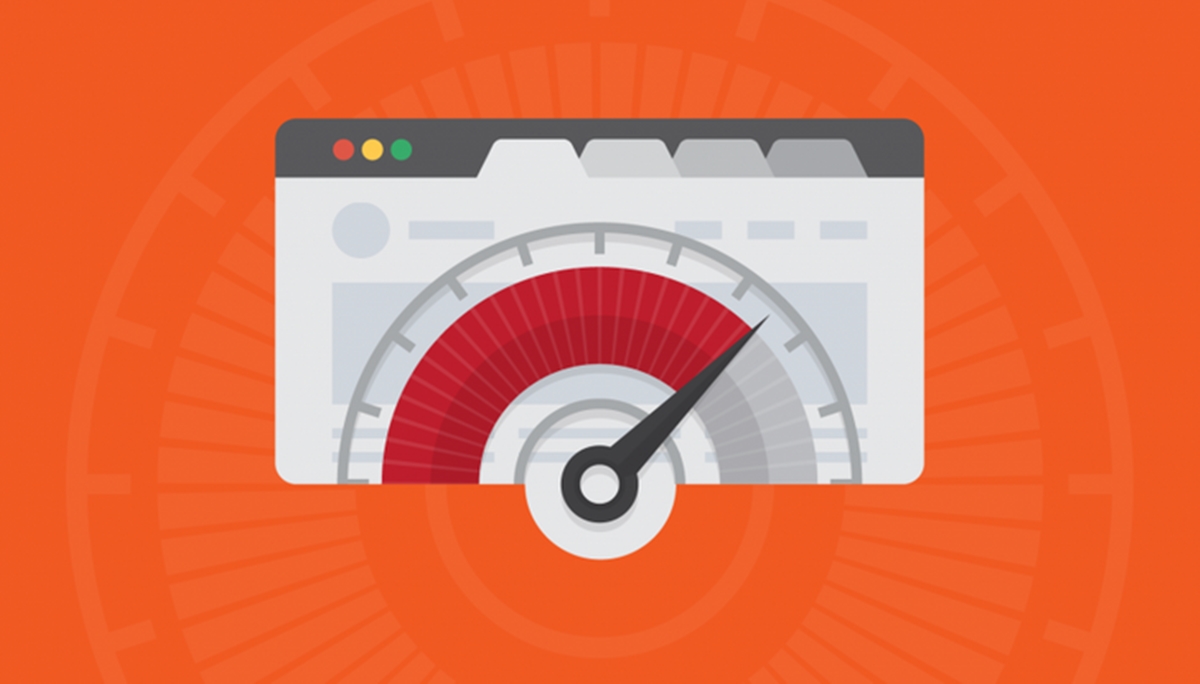
Performance capability is probably only second on the scale of importance when it comes to online shopping (right behind web design). Your website's performance capacity determines how quickly it can load. Online shoppers have little tolerance for websites that take a long time to load (Have you ever had to wait longer than five seconds for a website to load? I've barely got...)
Because of this, if your website loads slowly, visitors will simply leave before seeing your products. How do BigCommerce and Shopify's performance capacities compare to one another?
Performance Comparison:
| Platform | Performance | Load Time | Mobile Speed | Desktop Speed |
|---|---|---|---|---|
| Shopify | 3.9 | 1.3 | 63 | 75 |
| Bigcommerce | 4.5 | 2.2 | 63 | 80 |
Both platforms have very quick loading times in terms of speed. The average loading time for BigCommerce isn't too bad, even though Shopify is a little quicker. BigCommerce's average load time is 2.2 seconds, while Shopify's average load time was 1.3 seconds, placing it first.
I also used Google PageSpeed to look up the speed ratings for both the PC and mobile platforms. Both are excellent, but BigCommerce performs a little bit better on PCs. They both scored 63/100 on mobile devices.
BigCommerce SEO vs. Shopify SEO
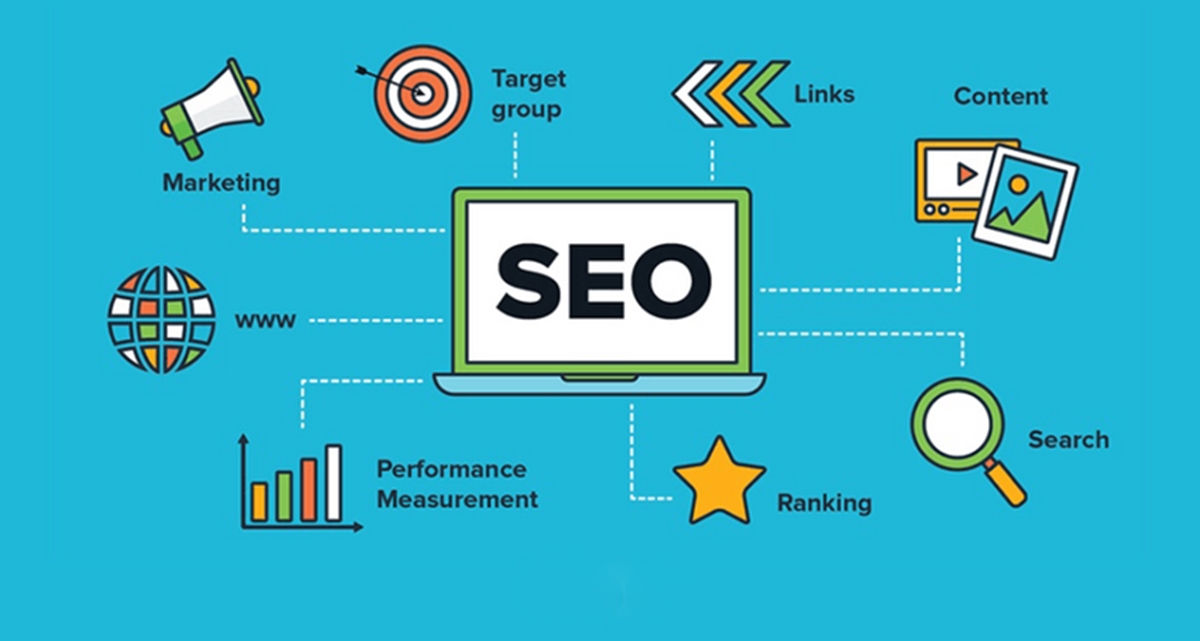
Making sure your customers can find you is the most crucial step in selling products. One of the best ways to accomplish that is through SEO. Driving traffic to online stores is made easier by using organic search and PPC ads. They optimize the content of landing pages and other page elements to drive traffic to your store using their understanding of typical search algorithm behavior.
SEO Comparison
Despite the fact that both Shopify and BigCommerce value this feature highly, Shopify's SEO capabilities lag behind those of BigCommerce. The rigid URL structure of Shopiy is one of the causes.
Google favors and ranks highly shorter and more understandable URLs. Because of this, having fully editable URLs works much better for optimization than forcing certain strings, which is what Shopify's URL structure does. In particular, while BigCommerce allows for full editing of its URLs, Shopify enforces the use of the terms "products" and "collections" in its URLs.
Certain URLs are inaccessible to Google because of the Robots.txt file. Use it for dynamic pages like search results and the shopping cart page, as Google advises. In contrast to BigCommerce, Shopify does not permit you to edit this file from your dashboard.
SEO also heavily relies on accelerated load times. All of the free templates and some of the premium templates from BigCommerce have AMP enabled by default. Additionally, you can decide what kind of content this feature is made available for. You'll need an app because Shopify doesn't already have this feature built in.
When it comes to SEO, BigCommerce outperforms Shopify in these areas. On both platforms, you can change your product title, descriptions, simple 301 redirects, and other things aside from them.
Blogging. The ability to blog is built into both platforms. You can create content with this feature that performs well on search engines. However, this blogging feature is quite simple in comparison to what WordPress offers. For instance, BigCommerce doesn't offer RSS feeds, and Shopify doesn't offer blog categories.
Why should you use BigCommerce Instead of Shopify?
- No transaction fees applied no matter what payment gateway you want to use.
- With the exception of the abandoned-cart-recovery functionality which is available on the Standard Bigcommerce plan only, you generally get more eCommerce features on the $29.95 and $79.95 Bigcommerce plans than on the Shopify counterparts.
- It's easier to create AMP versions of your store in Bigcommerce than in Shopify (and that is free too).
- While you can get a comprehensive set of reports available across all of the BigCommerce plans, Shopify doesn’t provide enough of the necessary reports on its $29 plan.
- Real-time carrier quotes are available much more cheaply with Bigcommerce — this functionality is included in its $29 per month plan, whereas Shopify only provides it on its $299 per month plan.
- You can easily include custom fields and file uploads as product options with Bigcommerce. This function is not readily available with Shopify, where workarounds or app installations are required.
- The Bigcommerce abandoned cart saver functionality is more flexible than Shopify's.
- With BigCommerce, you can sell in more currencies more easily.
- Credit card fees are slightly lower (if you are based in the US and using Braintree powered by Paypal).
- BigCommerce seems to have dedicated phone support available in more countries than Shopify
- Bigcommerce is compatible with more POS systems.
- All Bigcommerce plans provide you with an unlimited number of staff accounts.
- There’s an official Mailchimp integration for Bigcommerce while there’s none for Shopify.
Why should you use Shopify instead of BigCommerce?
- You can have access to automatic abandoned cart recovery at a significantly lower price point with Shopify ($29) than with Bigcommerce ($79).
- The 'Lite' plan enables you to start selling goods online considerably cheaper than Bigcommerce's entry level plan (assuming that you’ve already got a standable website with Wordpress or some other platform).
- Shopify’s theme offerings are better in terms of design and pricing.
- Shopify is more popular among dropshippers.
- Shopify templates look more distinct from one another than BigCommerce themes.
- Shopify's approach to categorizing products is more advanced than Bigcommerce. With Shopify, you can create collections which automatically populate and update themselves based on the criteria you’ve set up.
- Shopify has a much bigger app store than BigCommerce does. With Shopify, you can add any function that you can think of with third-party apps that you can find in the Shopify app store.
- GDPR compliance is easier to achieve in Shopify (albeit using a third-party app).
- It’s easier to adhere to VAT MOSS rules with Shopify than with BigCommerce, because Shopify can automatically calculate the relevant tax rates for you.
- Shopify Point of Sale is more tightly integrated with the product, and Shopify provides a dedicated mobile app for this functionality.
- Shopify's blogging tool comes with an RSS feed while the Bigcommerce blogging tool doesn't.
- There are no limitations on the number of sales you can make for your store no matter which plan you sign up for.
Final Words:
- For entrepreneurs who join the world of entrepreneurship for the first time, and are looking for a platform that they can use right away without having to spend too much time and effort getting used to it. Use Shopify.
- If you're not hesitant to do some more experimentation with your eCommerce platform, and you’re not afraid to get your hands on technical stuff, then use Shopify still...
Comments
Post a Comment